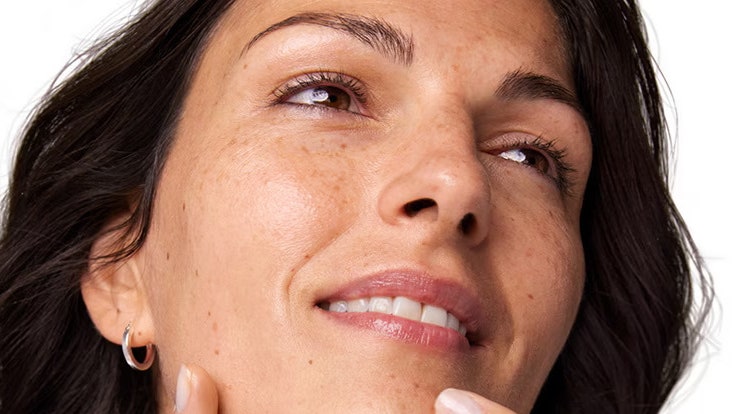Worden explains that by incorporating these rejuvenating ingredients into your regimen, you can expect the following results: fewer wrinkles and fine lines; even toned skin; improved texture, dullness, and hyperpigmentation; and elasticity. Read on to discover the best wrinkle creams our expert dermatologists and estheticians have actually tested and recommend—along with important ingredient callouts and application best practices.
When Should You Start Using a Wrinkle Cream?
“If your goal is to avoid all wrinkles, I would recommend starting one when you see the first signs of wrinkles, which is usually in your 20s,” Greenfield notes. “A cream will not prevent the formation of all wrinkles, but it can boost collagen production, an important step in anti-wrinkle skin care.” As you can never be too cautious, start with one active ingredient skincare product at a time when testing new additions to your skin-care routine, instead of opting for multi-action products.
Shirazi shares a bit more helpful application guidance on using a face cream for wrinkles: “If you are starting a retinol, avoid or reduce your exfoliation until your skin gets acclimated. For those with sensitive skin, avoid a retinol with other potent actives like vitamin C or glycolic acid at the same time. Wait 2–4 weeks before adding one or the other. Some may not tolerate strong acids like glycolic or salicylic acid with a retinol. I suggest skipping the retinol the nights you exfoliate with a strong acid.”
When to Apply Wrinkle Cream in Your Skincare Routine
Applying your chosen wrinkle cream isn’t much different than that of your favorite moisturizer. Generally speaking, it’ll be the last step in your skincare regimen. However, because these formulas are most often packed with potent ingredients, it’s best to apply them according to the provided instructions.
What do dermatologists recommend to treat wrinkles?
“A personalized approach combining skin-care and professional treatments is essential for optimal, long-lasting results when treating wrinkles,” says Engelman. “I typically recommend a combination of daily sun protection and a retinoid to help boost collagen and improve the appearance of fine lines and wrinkles. Hydrating ingredients such as hyaluronic acid and peptides can also help to plump and smooth the skin, softening fine lines.” For more pronounced wrinkles, Engelman recommends adding in-office procedures—more on that below—to the aforementioned regime.
Do wrinkle creams work as well as in-office treatments?
According to Engelman, the best wrinkle creams are effective for enhancing skin texture, diminishing the appearance of fine lines, and maintaining skin health over time. “However, more pronounced wrinkles often necessitate more intensive interventions,” as treatments can provide more dramatic and long-lasting results compared to creams alone.
Idriss adds that a tailored combination of treatments is key for smoothing out wrinkles in a way that befits each individual’s needs. “Botox effectively relaxes muscles to diminish dynamic wrinkles, while dermal fillers restore volume to deeper lines,” she says. “Resurfacing lasers exfoliate the skin and stimulate collagen production, enhancing texture over time.” As another option, microneedling creates micro-injuries that trigger collagen production; Idriss sometimes combines this with PRP (or a platelet-rich plasma injection) for added benefits. “Ultrasound and radiofrequency therapies also stimulate collagen for lifting and tightening effects,” she says. “Consulting with a qualified, board-certified dermatologist is essential to determine the best options for your specific skin concerns.”
Do wrinkle creams help prevent wrinkles?
“Wrinkle creams can help as a preventative measure to minimize the appearance of fine lines and wrinkles, especially when they contain ingredients like retinoids, antioxidants, and peptides,” Engelman says. “Retinoids are particularly effective because they stimulate collagen production and increase cell turnover, which keeps the skin looking smoother and more youthful. Antioxidants such as vitamin C also help to protect the skin from free radical damage caused by UV rays.” And of course, SPF reigns supreme. Idriss, who never hesitates to deliver straight-talking anti-aging advice to her 1.1 million Instagram followers, puts it this way: “The number one thing you can do for prevention is to wear the damn sunscreen!”
Meet the Skin Experts
- Dr. Nava Greenfield is a New York City–based and board-certified dermatologist at Schweiger Dermatology Group.
- Dr. Corey L. Hartman is a Birmingham, Alabama-based and board-certified dermatologist and founder of Skin Wellness Dermatology.
- Dr. Hadley King is a New York City–based and board-certified dermatologist specializing in cosmetic and medical dermatology.
- Dr. Elyse Love is a New York City–based and board-certified dermatologist specializing in medical and cosmetic treatments with a holistic approach to skin wellness.
- Candace Marino is a Beverly Hills–based celebrity facialist, otherwise known as The LA Facialist.
- Dr. Lauren Penzi is a New York-based board-certified dermatologist specializing in medical and cosmetic dermatology.
- Dr. Azadeh Shirazi is a San Diego–based and board-certified dermatologist specializing in medical, surgical, and cosmetic dermatology.
- Taylor Worden is a New York City–based celebrity esthetician and founder of Taylor Worden Skin.
- Dendy Engelman, MD, FACMS, FAAD is a board-certified dermatologist and Mohs surgeon at Shafer Clinic in New York City.
- Shereene Idriss, is a board-certified dermatologist, founder of Idriss Dermatology in NYC, and founder of the Dr. Idriss skincare line.
- Dr. Sammi Khalifian is a double board-certified dermatologist at SOM Aesthetics in Encinitas, California.




